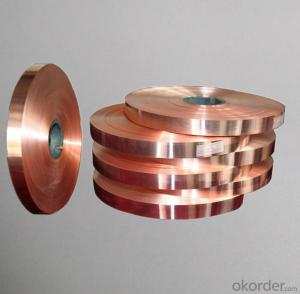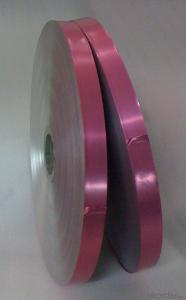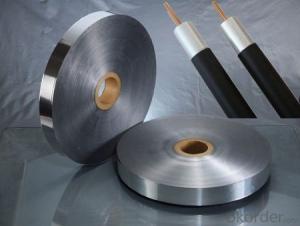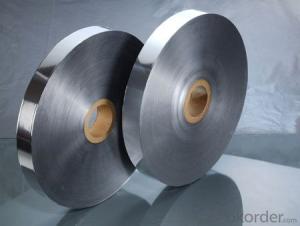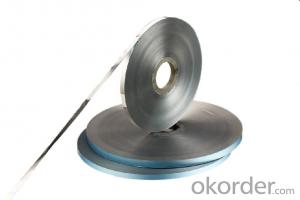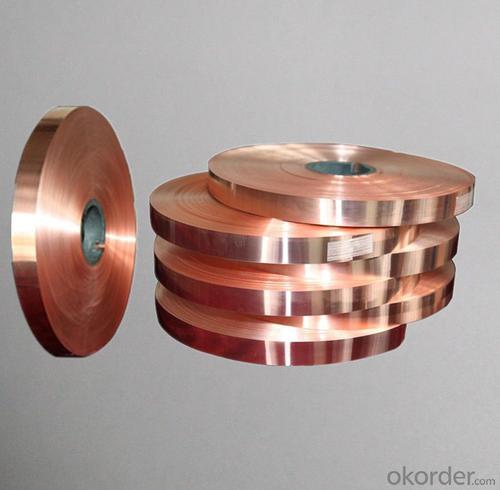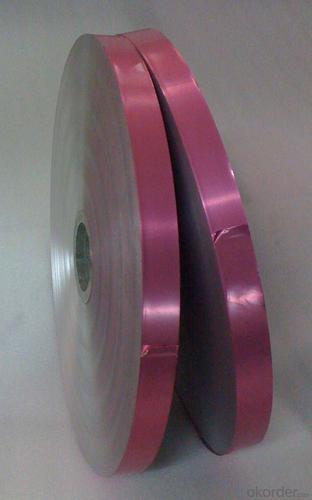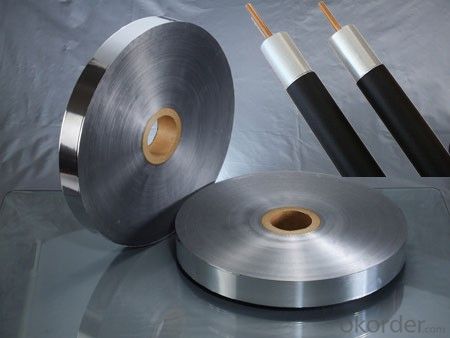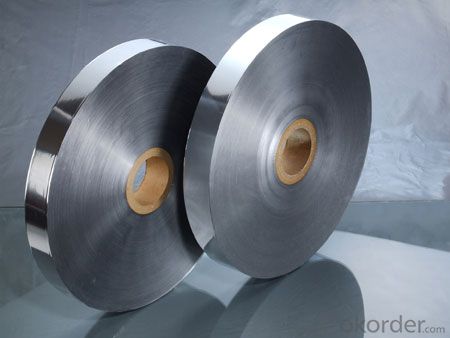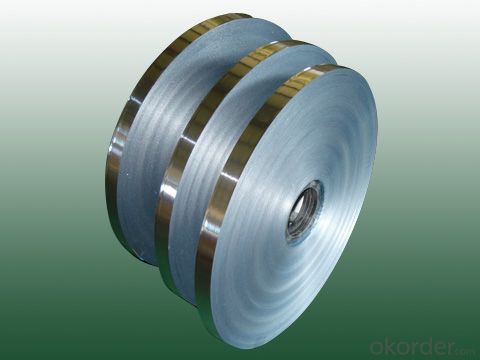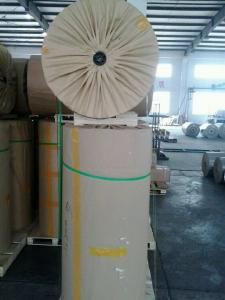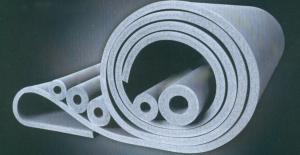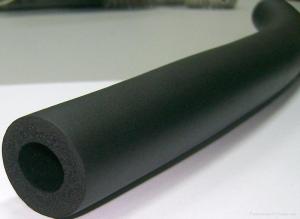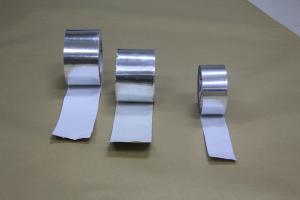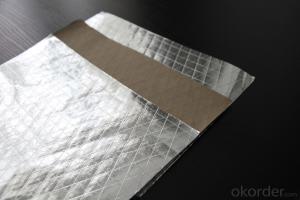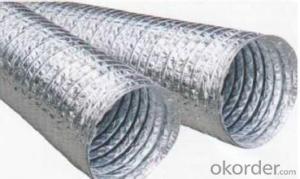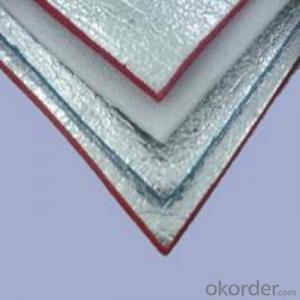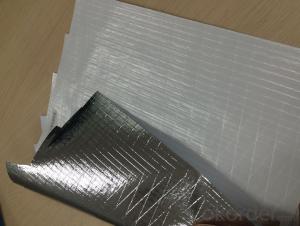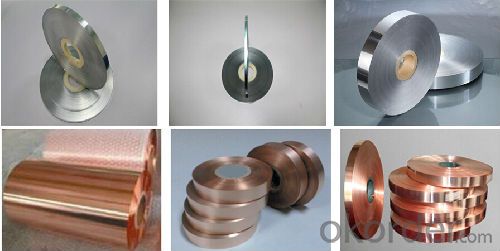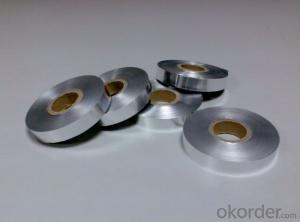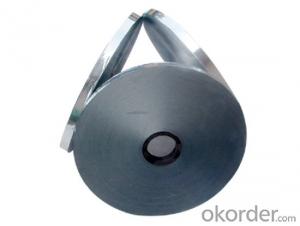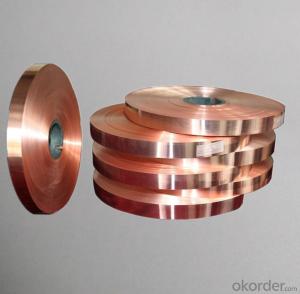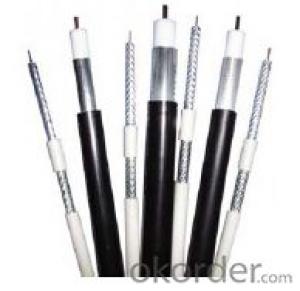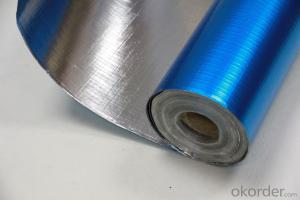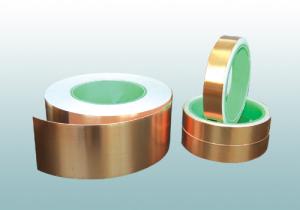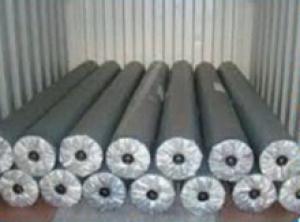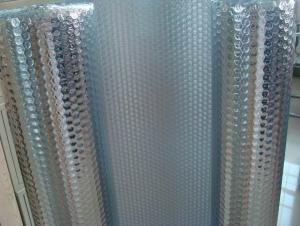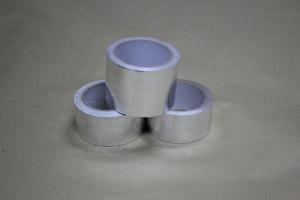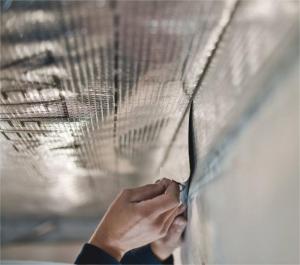Aluminum Foil Facing Laminated Copper Foil for Shielding Coaxial Cable
- Loading Port:
- Shanghai
- Payment Terms:
- TT or LC
- Min Order Qty:
- 1000 m²
- Supply Capability:
- 1000000 m²/month
OKorder Service Pledge
OKorder Financial Service
You Might Also Like
Aluminum Mylar foil Shielding Foil for Coaxial Cable communication cable
1.Structure of Aluminum Mylar foil Shielding Foil Description:
Electrical cable is used to transfer electricity, information and the realization of electromagnetic energy transformation. The electrical cable in a broad term mainly indicates to cable and in a narrow term indicate insulation material. Its definition is the aggregation of different parts below: one or more insulation cores, the wrapping layers of the cores, the general protective layers and the outer protective layers. Cables also include additive conductor without insulator.
2.Main Features of the Aluminum Mylar foil Shielding Foil:
Aluminum Mylar foil Shielding Foil is applicable to the shielding of coaxial cable, local network wire, electronic communication cable and computer peripheral wire etc.
1.Thickness: min 6.5mic; width: 300-1000mm.
2. According to GB/T 3198-2010.
3.Usages: cable shield, candy wrap
3. Aluminum Mylar foil Shielding Foil Images
4. Aluminum Mylar foil Shielding Foil Specification
AL-PET laminated foil
Description: Apply for overall or individual twisted pair shield for electronic cable and local network cables, protect from external electromagnetic interference. Features option of LUBRITAPE apply to decrease 50% friction of aluminum surface.
Construction: Aluminum foil, Polyester film
CODE | TOTAL THICKNESS | ALU THICKNESS | GLUE | POLYESTER FILM | WEIGHT |
FP007012 | 22±3 | 7 | 3 | 12 | 38.8±5% |
FP010012 | 25±3 | 10 | 3 | 12 | 46.9±5% |
FP020020 | 43±3 | 20 | 3 | 20 | 83.8±5% |
FP025012 | 40±3 | 25 | 3 | 12 | 87.6±5% |
Special specifications are also available, according to customer’s order. | |||||
AL-PET-AL laminated foil
Description: resilient shielding in cable assembling and provide the enhanced shielding required in harsh environments.
Construction: Aluminum foil +Polyester film+ Aluminum foil
CODE | TOTAL THICKNESS | ALU THICKNESS | GLUE | POLYESTER FILM | GLUE | ALU THICKNESS | WEIGHT |
DFP007015 | 35±3 | 7 | 3 | 15 | 3 | 7 | 65±5% |
DFP009020 | 39±4 | 9 | 3 | 15 | 3 | 9 | 76±5% |
DFP015025 | 61±5 | 15 | 3 | 25 | 3 | 15 | 115±5% |
DFP025025 | 80±5 | 25 | 3 | 25 | 3 | 25 | 175±5% |
Special specifications are also available, according to customer’s order. | |||||||
Bonded AL-PET laminated foil
Description: A laminated aluminum-polyester-aluminum tape is fully bonded to the foam dielectric to provide 100% coverage, longitudinally applied over the polyethylene core and the tape minimizes signal leakage.
Construction: Aluminum foil + Polyester film + Aluminum foil + EMAA film
CODE | TOTAL THICKNESS | ALU THICKNESS | GLUE | POLYESTER FILM | GLUE | ALU THICKNESS | GLUE | EMAA | WEIGHT |
DFPH009012 | 65±5 | 9 | 3 | 12 | 3 | 9 | 3 | 25 | 98±5% |
DFPH009020 | 72±5 | 9 | 3 | 20 | 3 | 9 | 3 | 25 | 108±5% |
DFPH009025 | 75±5 | 9 | 3 | 25 | 3 | 9 | 3 | 25 | 114±5% |
DFPH010025 | 84±5 | 10 | 3 | 25 | 3 | 10 | 3 | 25 | 126±5% |
Special specifications are also available, according to customer’s order. | |||||||||
Copper polyester foil
Description: Copper foil, copper lamination foil typically use as shielding for low/medium voltage cable and radio frequency coaxial cable. The rolled annealing copper foil is flexible to wrap cable core, also it has the excellent physical properties, Polyester film provides electrical insulation and high mechanical properties.
Construction: Copper foil + Polyester film
CODE | TOTAL THICKNESS | CU THICKNESS | GLUE | POLYESTER FILM | WEIGHT |
CP018012 | 33±3 | 18 | 3 | 12 | 175±10% |
CP007020 | 46±3 | 18 | 3 | 25 | 195±10% |
CP015012 | 30±3 | 15 | 3 | 12 | 160±10% |
Special specifications are also available, according to customer’s order. | |||||
5.FAQ
We have organized several common questions for our clients,may help you sincerely:
① Where you used this foil?
Aluminum Mylar foil Shielding Foil is used for cable shield, candy wrap for the shielding of coaxial cable, local network wire, electronic communication cable and computer peripheral wire etc.
②How to guarantee the quality of the products?
We have established the international advanced quality management system,every link from raw material to final product we have strict quality test;We resolutely put an end to unqualified products flowing into the market. At the same time, we will provide necessary follow-up service assurance.
③How long can we receive the product after purchase?
In the purchase of product within three working days, We will arrange the factory delivery as soon as possible. The pecific time of receiving is related to the state and position of customers.Commonly 7 to 10 working days can be served.
- Q: The user is asking if they can reuse their old aluminum foil facing to create new ones once it becomes worn out.
- <p>No, you cannot create new aluminum foil facings from old, worn-out ones. Aluminum foil facings are typically made from a specific type of aluminum that is bonded to a substrate. Once it wears out, the aluminum layer is compromised and cannot be reused to make new facings. Recycling old aluminum foil is the best option to reduce waste and conserve resources. You can recycle aluminum foil, which will then be processed and turned into new aluminum products.</p>
- Q: This question asks for various purposes that aluminum foil facing can be used for, other than its conventional use.
- <p>Aluminum foil facing has several alternative uses. It can be used as a reflective surface to enhance the heat distribution in grilling or baking. It can also serve as a protective barrier in gardening to deter pests or as a makeshift sled for sliding on snow. Additionally, it can be used to clean stubborn stains or as a shield to protect surfaces from paint splatters during home improvement projects. Some people even use it for crafting or DIY projects due to its malleability and reflective properties.</p>
- Q: This question asks for the correct method of wrapping food in aluminum foil, ensuring the shiny side faces outward.
- <p>To properly wrap food with aluminum foil, first ensure the shiny side of the foil faces outward. This side is non-stick and prevents food from sticking to the foil. Place the food in the center of a piece of foil large enough to cover it completely. Bring the edges of the foil together over the food, then fold and crimp the edges to seal tightly, creating a sealed pouch. This will help retain moisture and heat, and keep the food from sticking to the foil.</p>
- Q: Is it safe and practical to use recycled aluminum foil as a facing material in kitchen applications?
- <p>Yes, you can use recycled aluminum foil facing in your kitchen. Recycled aluminum is a sustainable and cost-effective material that retains the same properties as new aluminum. It is commonly used in kitchen applications such as backsplashes, countertops, and cabinetry due to its durability, low maintenance, and resistance to heat and moisture. However, ensure that the recycled aluminum foil facing is of high quality and meets safety standards to avoid any potential health or environmental concerns.</p>
- Q: Is it possible to recycle aluminum foil facing multiple times? If yes, what is the process involved?
- <p>Yes, aluminum foil facing can be recycled multiple times. The recycling process involves collecting and sorting aluminum waste, which is then shredded or crushed. The material is melted in a furnace at high temperatures, and the molten aluminum is poured into molds to form new products. This process can be repeated indefinitely without losing the quality of the aluminum, making it one of the most recycled materials globally. The recycling of aluminum saves energy and reduces the environmental impact compared to producing aluminum from raw materials.</p>
- Q: This question asks about the various types of aluminum foil facing that can be found in the market.
- <p>Aluminum foil facing is commonly used in construction for insulation and moisture protection. The different types available on the market include: 1) Plain Foil Facing, which is a simple, smooth aluminum surface; 2) Embossed Foil Facing, featuring a textured pattern for added strength; 3) Reinforced Foil Facing, which incorporates additional materials for enhanced durability; 4) Coated Foil Facing, where the aluminum is coated with other substances to improve performance; and 5) Laminated Foil Facing, which combines aluminum with other materials for specific applications. Each type serves different purposes and has unique properties that cater to various construction and industrial needs.</p>
- Q: The user is asking if it's possible to use aluminum foil with a shiny side facing outward to create a sandwich roll.
- <p>Yes, you can use aluminum foil to make a sandwich roll, but it's not recommended to use the shiny side facing outward. The dull side of the foil is typically used for food contact because it's less likely to transfer any potential residues or chemicals to the food. The shiny side may have a coating that isn't safe for direct food contact. Always ensure that the foil is food-safe and use it according to the manufacturer's instructions.</p>
- Q: Is it possible to use aluminum foil facing as a substitute for a pan or pot when making fried rice?
- <p>While aluminum foil can be used for various cooking purposes, it is not recommended to use it for making fried rice. Aluminum foil is not designed to withstand high heat and can warp or tear easily, leading to uneven cooking or potential food safety issues. Instead, use a non-stick pan or wok designed for high-heat cooking to ensure even heating and prevent sticking, which is crucial for a well-prepared fried rice dish.</p>
- Q: This question asks for a comparison of various materials used for food wrapping, highlighting their unique properties and uses.
- <p>Different types of food wrap materials include plastic wrap, aluminum foil, parchment paper, and beeswax wraps. Plastic wrap is versatile, clingy, and great for sealing in freshness, but it's not microwave-safe and may not be eco-friendly. Aluminum foil is heat-resistant, ideal for cooking and sealing, but it's not reusable and can tear easily. Parchment paper is non-stick, reusable, and safe for baking, but it's not as airtight as plastic. Beeswax wraps are eco-friendly, reusable, and can be used in the oven, but they are more expensive and not as widely available. Each type has its advantages and disadvantages depending on the specific use case, such as food storage, cooking, or sustainability.</p>
- Q: Is it safe to use aluminum foil facing to wrap vegetables or fruits for roasting or grilling?
- <p>Yes, you can use aluminum foil facing to wrap vegetables or fruits before roasting or grilling. Aluminum foil is a common and safe method for cooking food as it retains moisture and heat, allowing for even cooking. However, ensure that the foil does not come into direct contact with the heat source for extended periods to avoid any potential risk of aluminum leaching into the food. It's also important to use heavy-duty aluminum foil for cooking to prevent tearing or puncturing during the cooking process.</p>
Send your message to us
Aluminum Foil Facing Laminated Copper Foil for Shielding Coaxial Cable
- Loading Port:
- Shanghai
- Payment Terms:
- TT or LC
- Min Order Qty:
- 1000 m²
- Supply Capability:
- 1000000 m²/month
OKorder Service Pledge
OKorder Financial Service
Similar products
Hot products
Hot Searches
Related keywords
